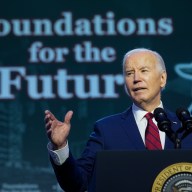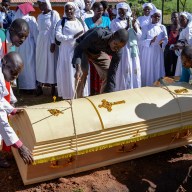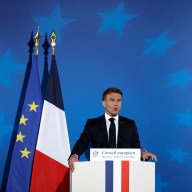By Elaine Lies and Kiyoshi Takenaka
TOKYO (Reuters) – Japanese Prime Minister Shinzo Abe appointed a conservative ally as defense minister in a cabinet reshuffle on Wednesday that left most key posts unchanged, and he promised to hasten the economy’s escape from deflation and boost regional ties. New defense minister Tomomi Inada, previously the ruling party policy chief, shares Abe’s goal of revising the post-war, pacifist constitution, which some conservatives consider a humiliating symbol of Japan’s World War Two defeat. She also regularly visits Tokyo’s Yasukuni Shrine for war dead, which China and South Korea see as a symbol of Japan’s past militarism. Japan’s ties with China and South Korea have been frayed by the legacy of its military aggression before and during World War Two. Asked if she would visit Yasukuni on August 15, the emotive anniversary of Japan’s surrender in World War Two, Inada sidestepped the query.
“It’s a matter of conscience, and I don’t think I should comment on whether I will go or not,” she told a news conference.
Inada, a 57-year-old lawyer, is the second woman to hold the defense post. The first, Yuriko Koike, who held the job briefly in 2007, was recently elected Tokyo governor.
The foreign ministries of China and South Korea had no immediate comment on the appointment.
She also echoed Abe in emphasizing the danger posed by North Korea’s missile launch, and the need for close regional ties.
“We will steadily strengthen ties with neighboring countries such as China and South Korea, and proceed with talks with Russia for a peace treaty,” Abe told an earlier news conference.
Japan and Russia never signed a formal treaty after World War Two because of a territorial dispute.
“Today, North Korea yet again carried out a ballistic missile launch. It appears to have fallen within Japan’s EEZ, which poses a grave threat to Japan’s security and is an unforgivable outrage,” he said. A Japanese defense official said the main body of the missile launched by North Korea, following a series of missile tests by the isolated country, landed in Japan’s offshore exclusive economic zone (EEZ). Abe is expected to travel to China in September for a Group of 20 summit, where he may meet Chinese President Xi Jinping to help mend ties also strained by a row over tiny isles in the East China Sea and China’s growing assertiveness in the South China Sea. China is North Korea’s main ally but it disapproves of the North’s nuclear program and missile tests.
GOING FOR GROWTH
Abe, who is trying to rekindle growth as he ponders the possibility of staying in office after his term as president of the ruling Liberal Democratic Party (LDP) ends in 2018, said on Wednesday that his top priority was the economy. On Tuesday, his outgoing cabinet approved 13.5 trillion yen ($133.58 billion) in fiscal steps to try to revive the economy.
Abe, who took office in December 2012, will retain his righthand man, Chief Cabinet Secretary Yoshihide Suga, along with Finance Minister Taro Aso and Foreign Minister Fumio Kishida.
Economics Minister Nobuteru Ishihara will also be kept on, along with Health, Welfare and Labour Minister Yasuhisa Shiozaki. Deputy Chief Cabinet Secretary Hiroshige Seko will become trade and industry minister. Tamayo Marukawa, the environment minister in the previous cabinet, was appointed minister to oversee preparations for Tokyo’s 2020 Summer Olympic Games.
Abe also appointed a new LDP executive line-up.
The appointment of Toshihiro Nikai, 77, as LDP secretary general was seen as signaling Abe’s hopes for a third term.
But Abe said there was plenty of work to do over the next two years and he was not thinking of extending his term.
(Additional reporting by Kaori Kaneko, Nobuhiro Kubo, Tetsushi Kajimoto, William Mallard, Minami Funakoshi and Tim Kelly in Tokyo, James Pearson in SEOUL and Michael Martina in BEIJING; Writing by Linda Sieg; Editing by Robert Birsel and Clarence Fernandez)


















